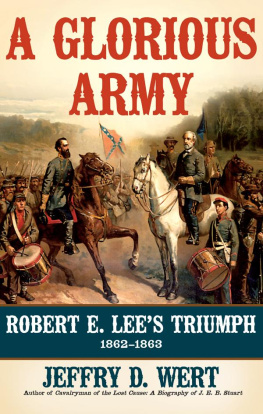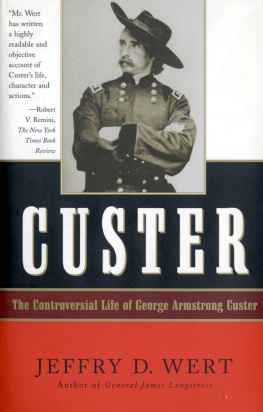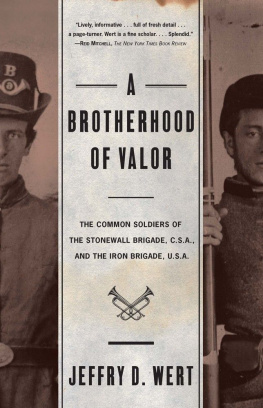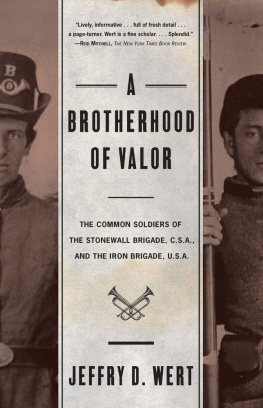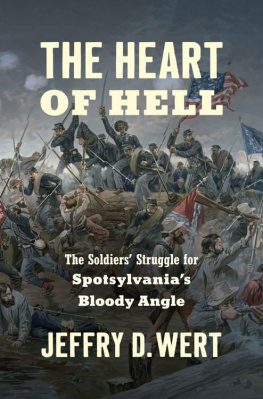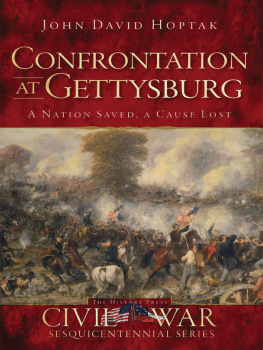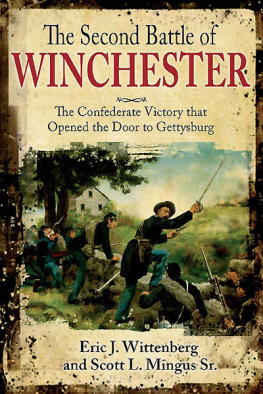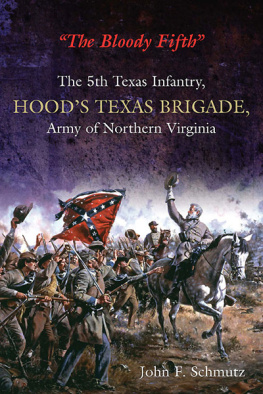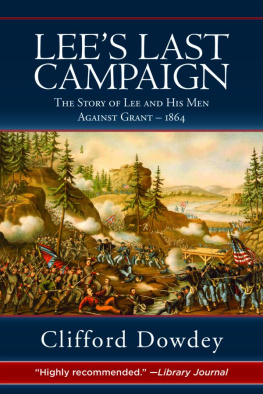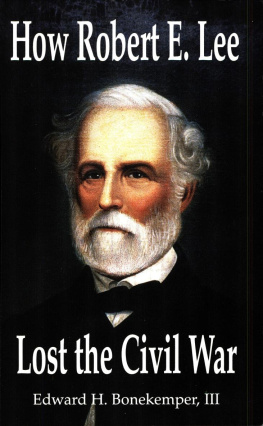


A LSO BY J EFFRY D. W ERT
Cavalryman of the Lost Cause: A Biography of J. E. B. Stuart
The Sword of Lincoln: The Army of the Potomac
Gettysburg: Day Three
A Brotherhood of Valor: The Common Soldiers of the Stonewall Brigade, C.S.A., and the Iron Brigade, U.S.A.
Custer: The Controversial Life of George Armstrong Custer
General James Longstreet: The Confederacys Most Controversial SoldierA Biography
From Winchester to Cedar Creek: The Shenandoah Campaign of 1864


Simon & Schuster
1230 Avenue of the Americas
New York, NY 10020
www.SimonandSchuster.com
Copyright 2011 by Jeffry D. Wert
All rights reserved, including the right to reproduce this book
or portions thereof in any form whatsoever. For information address
Simon & Schuster Subsidiary Rights Department,
1230 Avenue of the Americas, New York, NY 10020.
First Simon & Schuster hardcover edition April 2011
SIMON & SCHUSTER and colophon are registered trademarks
of Simon & Schuster, Inc.
The Simon & Schuster Speakers Bureau can bring authors
to your live event. For more information or to book an event,
contact the Simon & Schuster Speakers Bureau at 1-866-248-3049
or visit our website at www.simonspeakers.com .
Designed by Paul Dippolito
Manufactured in the United States of America
1 3 5 7 9 10 8 6 4 2
Library of Congress Cataloging-in-Publication Data
Wert, Jeffry D., 1946
A glorious army: Robert E. Lees Triumph, 18621863 / Jeffry D. Wert.
First Simon & Schuster hardcover edition.
p. cm.
Includes bibliographical references and index.
1. Confederate States of America. Army of Northern Virginia.
2. United StatesHistoryCivil War, 18611865Regimental histories.
3. United StatesHistoryCivil War, 18611865Campaigns.
4. Lee, Robert E. (Robert Edward), 18071870Military leadership.
I. Title.
E470.2.W45 2011
973.742dc22
2010046544
ISBN 978-1-4165-9334-8
ISBN 978-1-4165-9847-3 (ebook)
All photographs are from the United States Military History Institute
(USAMHI), Carlisle, Pennsylvania.
To my mother, Kathleen M. Wert,
and my mother-in-law, Ethel L. Long
Contents
Preface and Acknowledgments
In May 1863 Robert E. Lee confided to a subordinate, John Bell Hood, There never were such men in an army before. Lee wrote those words within weeks of the armys recent victory at Chancellorsville. At that time, at the midpoint of the Civil War, the Army of Northern Virginia had come to embody Confederate nationalism and to fire southern aspirations of an independent nation. In less than a year Lee, his lieutenants, and the common soldiers who followed them had redirected the wars course in the East.
Lee assumed command of the army on June 1, 1862. In the estimation of his foremost biographer, Douglas Southall Freeman, his appointment marked the turning point of the war in the East. During the next thirteen months the Confederate commander and his army crafted a record of achievement unmatched by any army in the annals of American military history. They won four major victoriesthe Seven Days, Second Manassas, Fredericksburg, and Chancellorsvilleheld the bloody ground at Antietam, and were on the march to a reckoning at Gettysburg.
My book examines that span of time, from the weeks immediately before the Seven Days Campaign through the three-day engagement at Gettysburg. A final chapter covers the twenty-one months of warfare after Gettysburg, which ended for Lees army at Appomattox Court House. My intent is not to offer detailed tactical studies of each battle, for there are excellent works on all of the engagements, but to offer a narrative and analysis of the fighting, with a focus on leadership and on the experiences of men on the firing lines. I have drawn heavily from the letters, diaries, and memoirs of the armys veterans and from the fine recent scholarship of fellow historians.
In a sense this is an exploration, a search for answers to questions and controversies. I address Lees strategic and tactical boldness, its cost in staggering casualties, the performances of his senior lieutenantsStonewall Jackson, James Longstreet, Jeb Stuart, A. P. Hill, and Richard Ewellthe morale and discipline of the men in the ranks, the roles of brigade and regimental commanders, and the misfortunes and failings of the Union Army of the Potomac. My judgments and conclusions will surely not end the debates nor resolve the controversies. The craft of history is never stagnant; it is ongoing, offering new insights and fomenting more disagreements. I hope my book contributes to the discussions.
Decades ago, as a college freshman, I first read Freemans three-volume Lees Lieutenants: A Study in Command. Although I was already a Civil War buff, my fascination with the Army of Northern Virginia began when I sat hour after hour with Freemans elegant prose. Since then the writing of history has taken me with Lees men as they defended an unfinished railroad bed at Second Manassas, stood in the sunken road at Antietam, manned a stone wall at Fredericksburg, crossed farmers fields toward Cemetery Ridge at Gettysburg, and marched the final steps on a road at Appomattox. This book is a return for me. I am surely not alone in being drawn back to their story.
As always, my book has benefited from the assistance of others. All errors of omission and commission are, however, entirely mine.
I wish to thank the archivists and librarians at the institutions cited in the bibliography for their assistance and understanding. The following individuals deserve my particular gratitude and recognition:
Joseph Pierro, a historian, author, and a friend, for reading the entire manuscript, offering perceptive insights, and improving my writing.
Horace Mewborn, a historian on operations of Lees cavalry and a friend, for commenting on sections of the manuscript and posing insightful questions on it.
Robert K. Krick, the modern authority on the Army of Northern Virginia and a friend, for sharing copies of material with me.
Ted Alexander, the chief historian at Antietam National Battlefield and an old friend, for reading my chapter on the Maryland Campaign and sharing with me his unequaled knowledge of the operations.
Daniel Laney, Civil War preservationist and historian and valued family friend, for poring over most of the manuscript, correcting my errors, and challenging my conclusions.
Robert Gottlieb, chairman of Trident Media Group, and my agent, for his advice and constant efforts on my behalf.
Bob Bender, my editor, for all that he has done for me in our association of more than twenty years and for always making my work so much better.
Johanna Li, associate editor, for her kindness, assistance, and tireless patience.
Our son, Jason Wert, our daughter-in-law, Kathy Wert, our grandchildren, Rachel and Gabriel Wert, our daughter, Natalie Wert Corman, and our son-in-law, Grant Corman, for their love, support, and all that they mean to Gloria and me.
My wife, Gloria, my best friend and cherished love, who has shared all this work throughout these many years. Without her, none of this is possible or of meaning.
Next page
